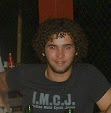Men of Ideas (1978) and The Great Philosophers (1987) are two BBC programs put forward and conducted by the philosopher and author, Bryan Magee. Both programs are based on the interview of an intellectual figure addressing a particular issue, either being current works of themselves that have had a great impact in the interviewee's field of competence (Men of Ideas) or History of Philosophy (The Great Philosophers). Needless to say, Bryan Magee within these programs is not just an interviewer, he is often driving the attention to very elusive or darkly explained subjects. Magee partners with the interviewee to engage in very deep philosophical debates while being an accomplice of the audience without any sign of condescendence.
I want to share with you a great example of this kind of talks: an interview with Prof. Noam Chomsky on his works that has revolutionized the field of linguistics and that have had a strong impact in psychology. Chomsky is one the fathers of the cognitive sciences which transcend language inquiries.
Enjoy!
Almost ten years after, The Great Philosophers (1987) is as good as Men of Ideas. You will see recurrent figures in the interviews, such as Anthony Quinton, Bernard Williams and John Searle. Here you have a list of episodes I can suggest:
Martha Nussbaum on Aristotle
I want to share with you a great example of this kind of talks: an interview with Prof. Noam Chomsky on his works that has revolutionized the field of linguistics and that have had a strong impact in psychology. Chomsky is one the fathers of the cognitive sciences which transcend language inquiries.
Enjoy!
Other episodes of Men of Ideas (1978) that I can recommend are:
Anthony Quinton on "The Two Philosophies of Wittgenstein"
Bernard Williams on "The spell of Linguistic Philosophy"
John Searle on "The Philosophy of Language"
Hilary Putnam on "The Philosophy of Science"
Iris Murdoch on "Philosophy and Literature"
Almost ten years after, The Great Philosophers (1987) is as good as Men of Ideas. You will see recurrent figures in the interviews, such as Anthony Quinton, Bernard Williams and John Searle. Here you have a list of episodes I can suggest:
Myles Burnyeat on Plato
Martha Nussbaum on Aristotle

Comments
Post a Comment